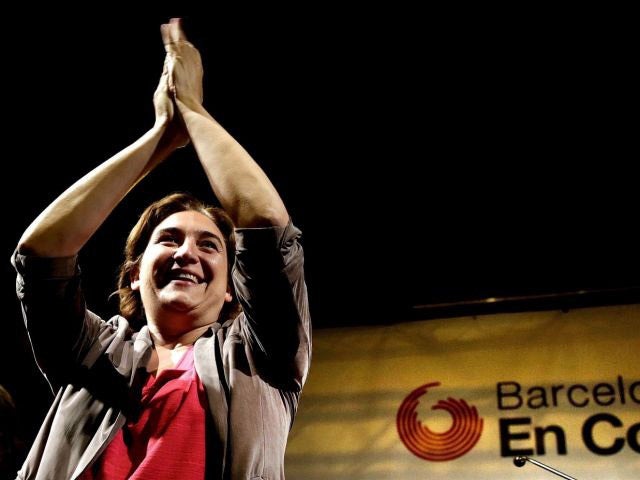The Mayor of Barcelona has taken on the banks before Spanish elections
In Barcelona, Ada Colau has secured an agreement for 200 homes to be taken from the bank Sareb and turned into social housing, showing the power of Spain's 'new politics'

If the politics of post-crisis Spain can be summed up by one issue, it’s housing. At the peak of the crisis in 2012, over 500 Spanish families were being evicted from their homes every day. As a consequence, La PAH, the housing rights platform set up in Barcelona in 2009, became the most significant social movement in the country, and its spokeswoman, Ada Colau, one of the most influential voices on the national stage. Through a combination of direct action and political campaigning, La PAH put housing at the top of the Spanish political agenda.
On the back of her success as an activist, Colau was catapulted into the Barcelona mayoralty at the local elections in May, backed by Barcelona en Comú, a citizen platform of social movements and progressive political parties. Her first move on taking office was to launch negotiations with the city’s major banks, demanding they hand over empty properties to the city hall for use as social housing. They could do so, she said, “either the easy way, or by legal force.” She wasn’t bluffing. With negotiations ongoing, the new government took advantage of a housing law, passed in 2007 but never applied in Barcelona, to fine banks that kept properties in the city empty for over two years.
This week, the negotiations started to bear their first fruits: the city hall signed a groundbreaking agreement with state bank, Sareb, for the transfer of 200 flats to the city for a period of eight years. The properties will be offered to people in urgent need of social housing. The mayor dubbed the news ““an important first step”, but insisted the city needs much more social housing to meet current levels of demand. The city government is now set to force other banks to give up over 1400 more empty properties.
Barcelona’s agreement with Sareb is testament to the radical potential of alliances between social movements and the political parties they have given birth to in recent years. The handover of the 200 flats in Barcelona is, above all, a victory of La PAH and its tenacious grassroots campaign against the perversity of homelessness in the country with the largest supply of empty housing in Europe. The very law that gives cities the power to oblige financial institutions to hand over empty properties for use as social housing was the result of a citizen initiative drawn up by La PAH. However, without a city government with the political will to put this law into practice, the new law would have served for very little.
The line between social movements and institutional politics is becoming increasingly blurred in Spain, particularly since the local elections in May, which saw citizen platforms sweep to power in major cities across the country. In Barcelona, it’s now not uncommon to see a city councillor negotiating with banks to prevent evictions one day, and taking direct action on the street to prevent them the next. Maintaining this connection between elected representatives and everyday life, and avoiding the professionalization of politics, is central to the spirit of the so-called ‘new politics’.
With the Spanish general election campaign entering its final days, La PAH has been actively campaigning against the parties that don’t include its five basic demands in their manifesto: the Popular Party, the socialists and Ciudadanos. Colau has thrown her weight behind Podemos, calling the elections “an opportunity to bring citizen-led politics from our cities to the Spanish Congress”. Nevertheless, she has publicly warned Pablo Iglesias that, should he fail to live up to expectations, he can expect to see her back on the streets demonstrating against him. “After all”, she joked at a campaign rally last night, “he know’s I’m good at it!”
Join our commenting forum
Join thought-provoking conversations, follow other Independent readers and see their replies
0Comments